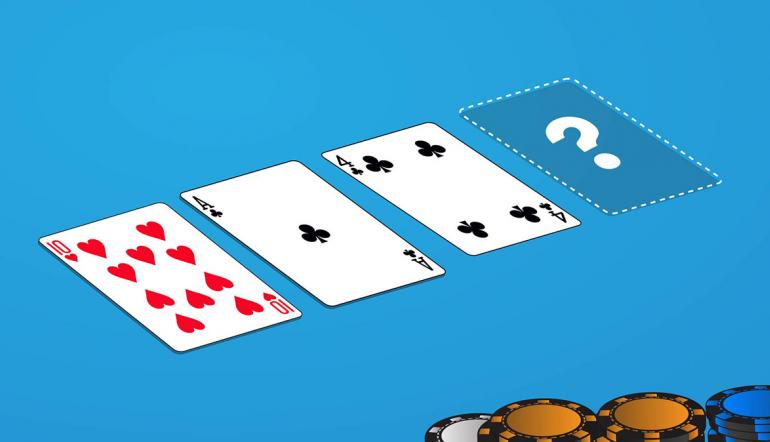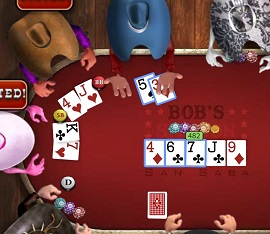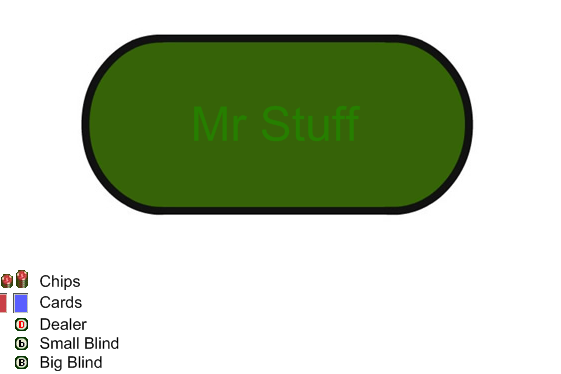Texas Hold’em poker is everywhere these days — on TV, online, and in clubs and casinos. Before you sit down to a game of Texas Hold ’em, make sure you’re in good shape to be successful — take care of non-poker issues and check your physical, mental, and financial status. During the game, you need to understand basic odds and playable hands, as well as how to bluff successfully and follow proper poker etiquette. Texas Hold ‘Em also has its own abbreviations for online play.
- Quick Tips For Texas Holdem Poker Tournaments
- Quick Tips For Texas Holdem Pokerer
- Quick Tips For Texas Holdem Poker Vegas World
- Quick Tips For Texas Holdem Poker Wsop
.www.OnlineCasinoReports. Online Casino Reports brings you three basic tips for playing Texas Holdem Poker. Playing style, sitting order and recognizing a bluff when presented with one are key elements to winning the game. Limit Hold’em Tips. Fixed-Limit Texas Holdem has been waning in popularity since poker exploded around the turn of the millennium. That being said, it was once the standard in casinos the world over, and to this day it is a very popular form of poker in both cash games and tournaments alike. 10 Quick Poker Strategy Tips That Will Help Your Game If you’re looking for easy to remember and quick poker tips that will help you win at No Limit Hold’em, you’re in luck! Today we’ve compiled 10 tactics and strategies that will make you a more confident and profitable poker player.
Playable Texas Hold’em Hands
Texas Hold’em is a game of strategy, like any poker game, but where you’re sitting in relation to the action becomes part of your strategy when playing Hold’em. If you bet early, you generally need better cards than you do if you’re one of the blinds. The following table offers sound advice on what hands are playable when you’re sitting in different positions.
Questions to Ask Yourself before You Play Texas Hold’em
Whether you’re playing Texas Hold’em for fun or money — make that whether you’re playing for high stakes or low stakes — make sure you’re in a position mentally, physically, and financially to enjoy the game and make the most of your chances. Ask yourself these questions before you sit down to a game:

What is the purpose of my playing this session? Whether it’s to learn more, win money, or just hang with friends for a good time, make sure you know why you’re there and that you’re doing everything you can to accomplish that goal.
If I were to play an opponent who’s exactly the same as a well-rested, un-stressed version of me, would that person have an advantage? If the answer is “yes,” hold off on playing until you’re in a better psychological and physical state.
Can my bankroll handle this level of play? If not, play a lower level.
Are there any distractions in my life that I need to get rid of before I play? Pay your rent, walk your dog, call your significant other — whatever it is, get it out of your head so you can focus.
Do I know if the house I’m playing in has any bonuses for players such as bad beat jackpots, high hands, free food and/or drinks for players, or freeroll tournaments? If not, ask a floorperson before you start playing and find out about the details of how you can qualify.
Is there an aggressive person at the table I’ll be playing at? If so, try to get yourself seated to his left so you see the raises before your action and not after.
What do I know about the people sitting at the table? Whatever it is, use it to your advantage.
Rough Odds for Texas Hold’em
Playing poker is about playing the odds. The following list gives the odds for outcomes in Texas Hold’em hands. When you realize how heavily the odds are stacked against you, you may want to rethink going all-in before the flop with two suited cards. Use the odds to your advantage:
1 percent (1-in-100): Percentage of time that no player holds an Ace or a King at a table in a 10-handed game
1 percent (1-in-100): Percentage of time that if you hold two suited cards, you’ll flop a flush
6 percent (about 1-in-20): Percentage of time that five community cards will give pocket suited cards a flush
6 percent (about 1-in-20): Percentage of time that you’ll be dealt a pocket pair
8 percent (about 1-in-12): Percentage of time that you’ll hit at least trips after having a pair on the flop
12 percent (about 1-in-8): Percentage of time that you’ll flop trips if holding a pocket pair
12 percent (about 1-in-8): Percentage of time that two more cards will flop in the same suit as a suited pocket pair
19 percent (about 1-in-5): Percentage of time that the five community cards will at least trip your pocket pair
32 percent (about 1-in-3): Percentage of time that you’ll pair one of your cards on the flop (with no pocket pair)
33 percent (about 1-in-3): Percentage of time that you’ll make a full house or better after having trips on the flop
35 percent (about 1-in-3): Percentage of time that you’ll make a flush on the turn or river if you have four cards to a flush after the flop

Texas Hold’em Bluffing Tips
What makes any poker game exciting, and Texas Hold’em is certainly no exception, is that players can bluff at any point. Sometimes half the fun of a game is seeing whether you can successfully bluff an opponent out of some money. But, even as you’re misleading your opponents, make sure you bluff in the right circumstances. Heed these bluffing tips:
Only bluff where it makes a difference to your standing — either in a tournament or to your stack of chips.
Be careful bluffing someone considerably worse than you are. He may call just to see what you have, or on some probabilistically low draw when he already has you beaten anyway.
Bluff in situations where the board hints at the great hand you do not have: straights and flushes being hinted at by the board, the turn of an Ace, and so on.
Don’t try to bluff players who only play the most solid of hands if they’re still in the pot.
Don’t bluff people who are extremely likely to call.
Do bluff the timid or people who are likely to fold.
Remember that it’s easier to bluff in No-Limit than Limit because the bets (both implied and real) are bigger.
Poker Etiquette for Texas Hold’em
The etiquette tips in the following list apply to Texas Hold’em and to any other poker game. Sure, you can have fun while you play poker, but you can have all the fun you want without being impolite to the other players or the dealer. Basic poker etiquette includes these tips:
Always play in turn.
Be aware of when it’s your turn to post the blinds and do so promptly.
Any time there is a discrepancy at the table, talk to the dealer — not the other players — about it. If you’re not able to get satisfaction from the dealer, ask for a floorperson. Talking with other players about the problem you perceive may generate ill will among people who have no authority in the situation in the first place.
Place your bets in front of you. Do not splash them into the pot.
Do not show your hand to other players at the table while a hand is in progress.
Tell the dealer when you intend to raise. In No-Limit, gather the amount that you’re going to raise and either announce the total, or move it all forward with one motion. This prevents being called on a “string raise.”
Don’t forget to tip your dealer. Dealers work for minimum wage and rely on tips for their livelihood.
Online Poker Abbreviations for Texas Hold’em
Playing online poker in general, and Texas Hold’em in particular, is a very popular pastime. When you’re online, you may encounter abbreviations specific to the world of poker. To understand what other players are saying, get familiar with these online abbreviations:
| Abbreviation | What It Means | Abbreviation | What It Means |
|---|---|---|---|
| 86 | To remove or ban | ne1 | Anyone |
| brb | Be right back | nh | Nice hand |
| gc/nc | Slightly sarcastic phrase meaning good catch/nice catch | gg | Good game |
| lol | Laughing out loud | gl | Good luck |
| nl | No-Limit | ty | Thank you |
| n1 | Nice one | 🙂 | Smiley face (view sideways) |
The great thing about Texas Holdem Poker is that it is easy to learn. Even a beginner can quickly develop into a winning player. By following a sound strategy and playing the best starting hands a Texas Holdem Poker newbie can dramatically shorten the learning curve. So what are the best hands that a beginner should play?
The best hands for a beginner to play are Ace-Ace, King-King, Queen-Queen, Jack-Jack, Ace-King suited (example – Ace of clubs & King of clubs).
I strongly recommend that you only play these starting hands as a beginner. In other words, if you are dealt a hand other than one of the above then fold!
Folding is one of the most difficult decisions for a Texas Holdem Poker beginner to do. The mindset of most Texas Holdem Poker beginners is to hang around and see the flop in the hopes of hitting it just right and improving a hand.
While a beginner will hit the flop and improve their hand occasionally, more often than not they will miss it. The Texas Holdem Poker beginner player that plays poor starting hands will end up throwing more money away than they will win.

When you are dealt one of the best starting hands I recommend raising the pot which will serve two purposes. First, it will force players with weak hands to fold instead of allowing them to stay in the game and see the flop for free.
Secondly, by seeing who raises and calls you get to see who feels that they have a good hand and who may be trying to hang in for the flop.
When the flop is dealt you should look carefully to see if you have improved your hand. Even if you have not improved your hand, because you started out with one of the better hands you may still have the best hand. This is especially true if your starting hand was a pair of aces or kings.
If your opponents raise back this can be a strong signal that they may have a powerful hand. Ask yourself, “What could my opponent have?” “Could they have improved their hand?”
Quick Tips For Texas Holdem Poker Tournaments
Ask yourself these questions after each round of cards are dealt and try to “read” your opponents hand.

If you have a high pair a raise after the flop can help you assess whether your opponents feel if they have a strong hand or not.
Quick Tips For Texas Holdem Pokerer

If you think you are beaten there is no shame in folding at this point.
When the turn card has been revealed, if you think that you may still have the best hand I would raise the pot so that I could obtain information about my opponents’ hands.
Quick Tips For Texas Holdem Poker Vegas World
I would follow this same strategy on the river card.
To summarize this basic Texas Holdem Poker beginner strategy:
– stick to playing the best starting hands
– fold the bad hands
– use the power of the raise to knock out weak players and to assess the strength of your opponents hands
Quick Tips For Texas Holdem Poker Wsop
By following this Texas Holdem Poker beginner strategy you will start out winning more hands than you lose. You will start out winning more money than you will lose.